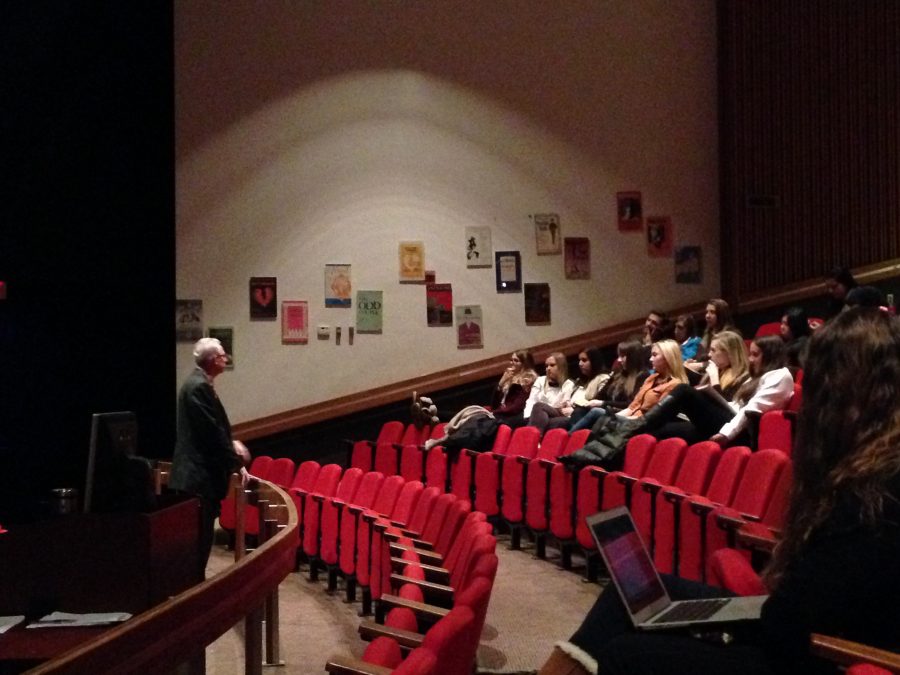During Chapel Hour on Thursday, February 26, students, staff, and faculty gathered in Eddy Theatre for a Town Hall Meeting with Vice President of Academic Affairs Dr. Jenna Templeton and Dean of Undergraduate Innovation Dr. William Lenz.
After an introduction from Templeton, Lenz introduced the new “Lego Block Model” for Undergraduate General Education designed to “simplify [general education] requirements and create clear pathways to graduation,” as was stated in his PowerPoint presentation.
The model’s name comes from “The Lego Movie” and its song—which Templeton played before the meeting commenced and is Lenz’s self-proclaimed mantra—“Everything is Awesome.”
Lenz and the administration have been brainstorming ways to improve the undergraduate experience in Chatham’s upcoming “new era” because Lenz said they did not want the fall of 2015 to be, “the year where we took the College for Women, threw in some men, and stirred them together with a big ladle.”
Their goal was to create a smooth and streamlined curriculum that is easy to construct and will serve each student individually.
The proposed program will allow students to switch majors or schools if their interests change without the fear that classes they have already taken will not towards their graduation requirements.
The first change regarding undergraduate education that Lenz discussed was that of the mission statement.
The new statement reads, “Chatham University prepares women and men to be world ready: to build lives of purpose and value and fulfilling work. In addition to appropriate professional skills and liberal arts learning, Chatham believes that world readiness means being an informed and engaged citizen in one’s communities; recognizing and respecting diversity of culture, identity, and opinion; and living sustainably on the planet.”
Next Lenz discussed the new proposed general education curriculum. Students will still be required to take 40 credits of general education; however, the proposed plan is meant to be more flexible for students.
Students would be required to take the one-credit SDE101 course that is already required.
The ENG105 writing seminar and the IND108 Gender and Contemporary Social Issues course would be combined into a three-credit Communication Seminar, taken in a student’s first fall term.
Students would need to take one three-credit course in each of the departments—Arts, Humanities, Social Sciences, Mathematics or Statistics, and Science (along with a one-credit science lab)—as is the present requirement.
In addition, students would have to take three additional three-credit upper-level elective courses in an area outside of their majors.
Students would be required to take two credits of PED or leadership classes, instead of the current four credits.
Finally, students would complete three mission courses, instead of the current seven, in the areas of International and Global Understanding, Sustainability and the Environment, and Engagement and Responsibility.
Next, Lenz discussed the Chatham Plan Professional Edge Certificate, which would require students to take four credits of job skills and career preparation, as well as the three-credit internship that is already required.
In order to graduate, students would still need to complete a minimum of 120 credits, six of which would be writing intensive courses in their major.
Instead of the current two-semester system of tutorial, students would be expected to complete an Integrative Capstone Seminar within their major. Over one semester, a student would complete a paper, an internship, or some other sort of project defined within his or her major that would help to prepare for work or further education after graduation.
Lenz was unconcerned about tutorial’s abridgement. Although a student would “lose time,” Lenz said the new system would, “make perhaps for a more intensive semester.”
Lenz was unable to answer many specific questions about the Capstone because, as he stressed, the requirements would be defined within a department, instead of by the administration.
Students would also need to complete a one-credit Eden Hall Field Practicum, designed to give students hands-on experience at the new campus. There is currently talk of having a shuttle between Eden Hall and Shadyside, leaving four times per day. Students could complete their 15 contact hours in one-hour increments weekly for a semester, or they could spend fewer but longer sessions at the sustainability campus.
Finally, students would be required to complete an online or hybrid course and at least one Maymester or Chatham Abroad Experience, and students would be required to have a passport, for which the university might pay.
Rising juniors and seniors (with more than 60 credits already completed) will finish their time at Chatham under the current requirements. However, rising sophomores will be asked to complete the new requirements that will be defined in the 2015-2016 catalogue. Exceptions may be made for students competing 3/2 programs or inflexible professional majors.
The proposed new model is still under consideration by the faculty. Although it has not yet been completely approved, Lenz said, “we expect that to be completed next week, but we did want to give students a chance to see what is being proposed.”
“This is very student centered,” said Lenz. “It’s all about your ability to succeed in [the real world].”


